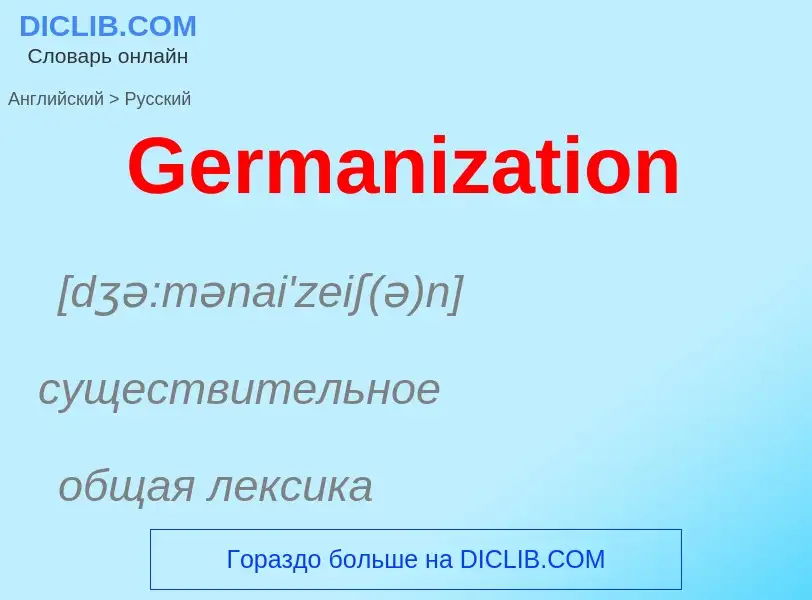Μετάφραση και ανάλυση λέξεων από την τεχνητή νοημοσύνη ChatGPT
Σε αυτήν τη σελίδα μπορείτε να λάβετε μια λεπτομερή ανάλυση μιας λέξης ή μιας φράσης, η οποία δημιουργήθηκε χρησιμοποιώντας το ChatGPT, την καλύτερη τεχνολογία τεχνητής νοημοσύνης μέχρι σήμερα:
- πώς χρησιμοποιείται η λέξη
- συχνότητα χρήσης
- χρησιμοποιείται πιο συχνά στον προφορικό ή γραπτό λόγο
- επιλογές μετάφρασης λέξεων
- παραδείγματα χρήσης (πολλές φράσεις με μετάφραση)
- ετυμολογία
Germanization - translation to ρωσικά
[dʒə:mənai'zeiʃ(ə)n]
существительное
общая лексика
германизация
онемечивание
['dʒə:mənaiz]
глагол
общая лексика
германизировать
онемечивать
онемечиваться
германизировать, онемечивать
устаревшее выражение
переводить на немецкий язык
Βικιπαίδεια
Germanisation, or Germanization, is the spread of the German language, people and culture. It was a central idea of German conservative thought in the 19th and the 20th centuries, when conservatism and ethnic nationalism went hand in hand. In linguistics, Germanisation of non-German languages also occurs when they adopt many German words.
Under the policies of states such as the Teutonic Order, Austria, the Kingdom of Prussia, and the German Empire, non-German minorities were often discouraged or even prohibited from using their native language, and had their traditions and culture suppressed in the name of linguistic imperialism. In addition, the Government also encouraged immigration from the Germanosphere to further upset the linguistic balance, but with varying degrees of success. In Nazi Germany, linguistic Germanisation was replaced by a policy of genocide against certain ethnic groups, even when they were already German-speaking.

![the Old Bridge (Stari most)]] in Maribor, Yugoslavia in 1941, now Slovenia the Old Bridge (Stari most)]] in Maribor, Yugoslavia in 1941, now Slovenia](https://commons.wikimedia.org/wiki/Special:FilePath/Bundesarchiv Bild 121-0723, Marburg-Drau, Adolf Hitler.jpg?width=200)
![Origin of German colonisers in annexed Polish territories. Was set in action "[[Heim ins Reich]]" Origin of German colonisers in annexed Polish territories. Was set in action "[[Heim ins Reich]]"](https://commons.wikimedia.org/wiki/Special:FilePath/Bundesarchiv R 49 Bild-0705, Polen, Herkunft der Umsiedler, Karte.jpg?width=200)


![Sudeten Germans]] after [[German occupation of Czechoslovakia]] in 1938 (in Šumperk/Mährisch Schönberg which had a German-speaking majority then) Sudeten Germans]] after [[German occupation of Czechoslovakia]] in 1938 (in Šumperk/Mährisch Schönberg which had a German-speaking majority then)](https://commons.wikimedia.org/wiki/Special:FilePath/SN zamazávají český název Šumperk.gif?width=200)
